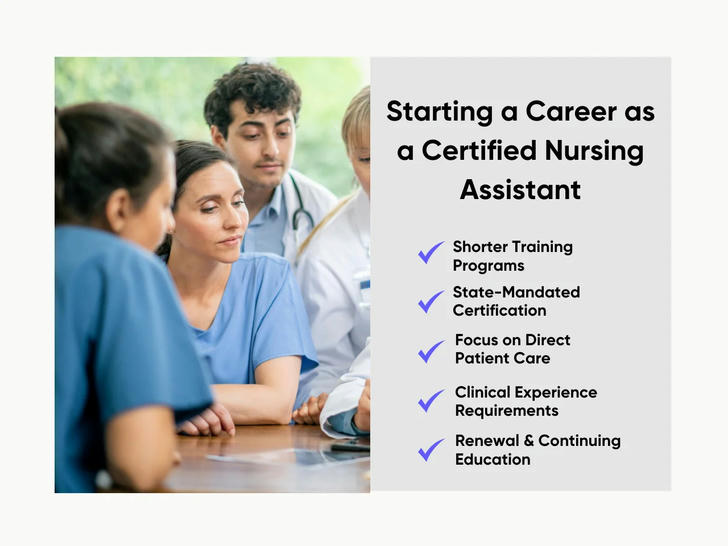Fast Track into the Healthcare Industry: Becoming a Certified Nursing Assistant (CNA)
If you're looking for a high-demand, stable job with low entry requirements, becoming a Certified Nursing Assistant (CNA) might be the perfect choice! Whether you're new to the workforce, changing careers, or just interested in healthcare, ✨a CNA course can help you gain skills and get hired quickly.

1. What is a CNA?🚀
A Certified Nursing Assistant (CNA) is a key part of the healthcare team, helping nurses take care of patients by assisting with:
Taking vital signs (blood pressure, heart rate, etc.)
Helping patients eat, bathe, and move around
Communicating with nurses and doctors
Providing basic medical care
2. Why Become a CNA? 💰
Becoming a Certified Nursing Assistant (CNA) is a great career choice for those interested in healthcare. Here are some compelling reasons to consider this path:
High demand – The aging population means more jobs for CNAs. As people live longer, there's a growing need for caregivers who can assist with daily living activities. This ensures job stability and security across various healthcare settings.
Quick to start – CNAs don't need a degree; they complete a short certification program that lasts a few weeks to months. This quick entry into the workforce allows you to start earning sooner. Training is practical and hands-on, preparing you to assist patients with basic care needs.
Career growth – A CNA certification is a stepping stone to higher-paying roles. Many CNAs become Licensed Practical Nurses (LPNs) or Registered Nurses (RNs), which can significantly increase earning potential. Specialization in areas like geriatrics or pediatrics also enhances career prospects.
Additional Benefits
Emotional Rewards: CNAs make a positive impact on patients' lives, providing emotional support during vulnerable times, which can be deeply fulfilling.
Flexibility: CNA roles offer flexible scheduling options across different healthcare settings, accommodating various lifestyles.
Overall, becoming a CNA offers strong job prospects, quick entry into the workforce, and opportunities for professional growth. It's ideal for those passionate about healthcare and wanting to make a difference.
3. What Do You Learn in a CNA Course?💼
CNA training includes both classroom and hands-on practice. Topics include:
Basic patient care (bathing, feeding, dressing)
Medical terminology & communication
CPR & emergency response
Measuring vital signs
4. Course Options ⚠️
Full-time: 4-12 weeks, ideal for fast-tracking into a job.
Part-time: 3-6 months, suitable for working adults.
Online classes: Some coursework can be done online, but hands-on training is required in person.
5. CNA Course Cost & How to Save Money 📩
Average cost: $500 to $2,500, depending on the school and state.
Training hours: Typically 75-150 hours.
Money-saving tips:
Look for low-cost programs with financial aid options.
Consider apprenticeships that combine training with work experience.

6. CNA Certification Exam & License🎨
After training, you must pass the CNA certification exam, which includes:
Written Test – Covers healthcare basics.
Skills Test – Hands-on patient care demonstration.
Registration: Must register with your state’s nursing board to start working. Some states also require a background check.
7. CNA Salary & Job Outlook💡
The demand for CNAs is growing across hospitals, nursing homes, and home healthcare services.
Average Salary:
Hourly Pay: $14 to $20
Annual Salary: $30,000 to $45,000
Best-paying states: Alaska, New York, California, Connecticut, New Jersey
Career Growth: CNA → LPN (Licensed Practical Nurse) → RN (Registered Nurse)
8. Who Should Become a CNA?🎯
No experience needed – Great for beginners.
Fast job entry – Start working in weeks.
Caring personality – Must enjoy helping people.
Physical stamina – Required for shift work, including nights & weekends.
9. Where to Take CNA Training?⭐
If you're searching for CNA classes near you, it's important to check for:
Accreditation: Ensure the institution is approved by the state nursing board.
Pass rate: Look for programs with high pass rates.
Hands-on training: Essential for practical experience.
Job placement support: Some programs provide career counseling and job placement assistance.
10. CNA FAQs🔴
How long does a CNA certificate last? Most states require renewal every 2 years with work experience or additional training.
Can I take CNA classes online? Some coursework can be done online, but hands-on training is required.
Is it hard to pass the CNA exam? Most students pass with good training and practice!
